Robinho Stats: Matches, Goals and Titles
Throughout his career spanning nearly two decades, Robinho showcased remarkable skill across multiple leagues and competitions. His journey from Brazilian prodigy to international star is reflected in an impressive statistical record that, while perhaps falling short of the extraordinary expectations placed upon him, still stands as testament to his considerable talent.
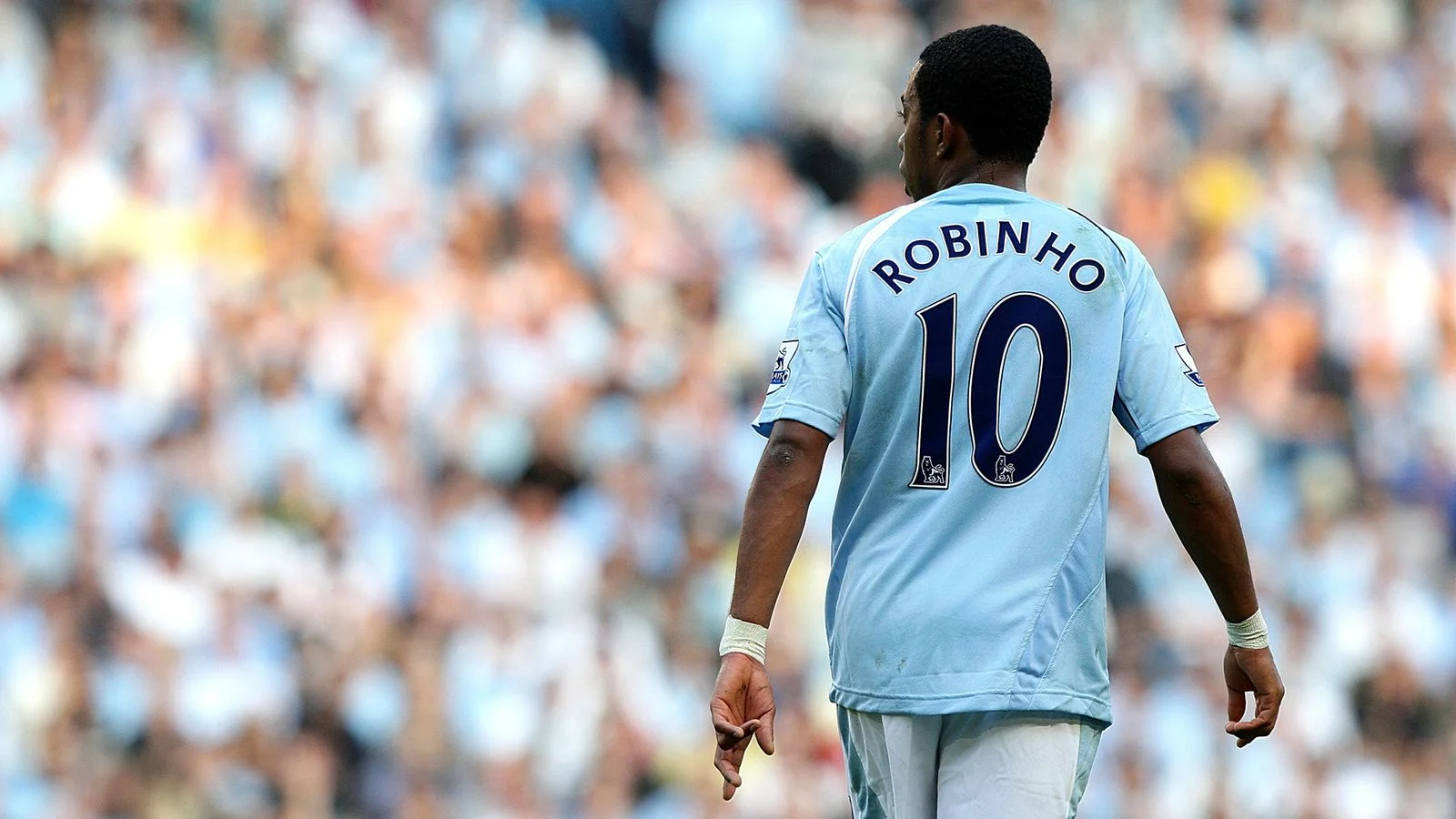
Club Statistics
Robinho’s club career took him through some of football’s most prestigious institutions, from his beloved Santos in Brazil to European giants Real Madrid and AC Milan. Each chapter of his career produced different statistical outcomes, reflecting both his development as a player and the varying tactical contexts in which he operated.
Santos FC
Robinho’s relationship with Santos FC spanned multiple periods throughout his career, beginning with his professional debut in 2002 and including three subsequent returns to the club. His statistics with Santos demonstrate both his early promise and his attempts to recapture that form in later years.
During his first spell (2002-2005), Robinho made 108 appearances, scoring 47 goals and providing 21 assists while winning the Campeonato Brasileiro twice (2002, 2004). His second spell in 2010, on loan from Manchester City, saw him make 14 appearances with 6 goals and 3 assists, helping Santos win the Copa do Brasil. In his third spell (2014-2015), he contributed 17 goals and 11 assists across 41 appearances, adding a Campeonato Paulista title in 2015. His fourth spell in 2020 was cut short when his contract was suspended before making any appearances.
In total, Robinho made 163 appearances for Santos across all competitions, scoring 70 goals and providing 35 assists. His goal-scoring rate of 0.43 goals per game at Santos was among the highest of his career, reflecting both his youthful exuberance during his first spell and his comfort in familiar surroundings during subsequent returns.
Real Madrid
Robinho’s time at Real Madrid (2005-2008) saw him compete at the highest level of European football, playing alongside some of the game’s greatest talents in the “Galácticos” era. His statistics during this period show a player making the adjustment to European football while still delivering significant contributions.
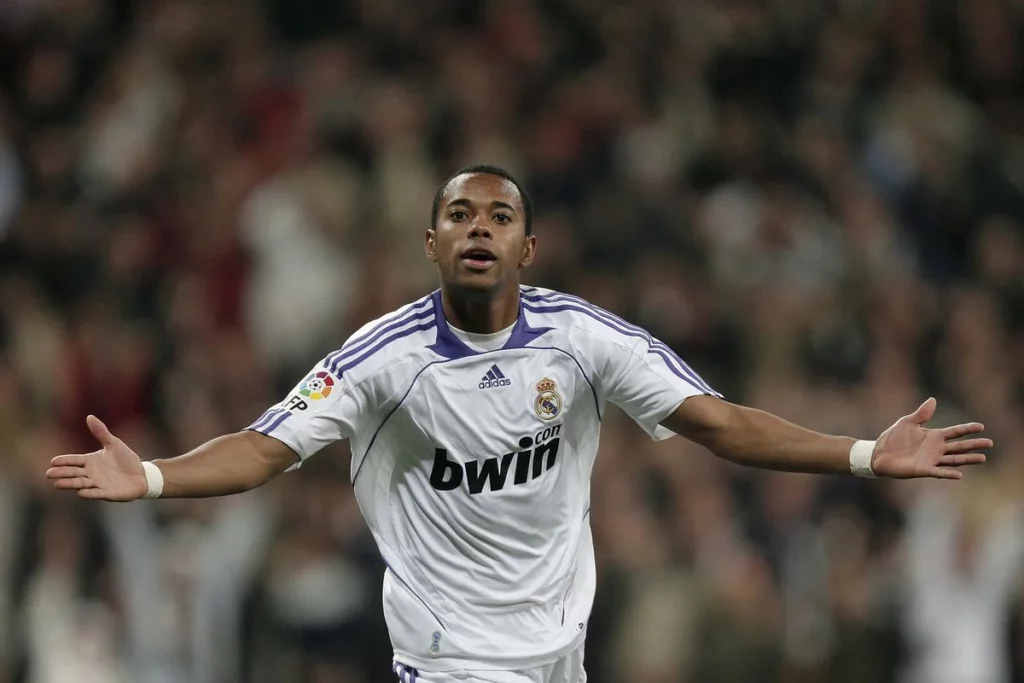
At Real Madrid, Robinho appeared in 137 matches, scoring 35 goals and providing 30 assists. He won La Liga twice (2006-07, 2007-08) and the Spanish Super Cup (2008). His scoring rate at Real Madrid (0.26 goals per game) was lower than at Santos, reflecting his adaptation to a more competitive league and a different tactical role. However, his assist numbers remained impressive, highlighting his creative contributions to the team’s attacking play.
During his time in Madrid, Robinho scored several memorable goals, including a spectacular solo effort against Espanyol and crucial strikes in the 2007-08 La Liga title-winning campaign. His final season (2007-08) was statistically his most productive at the club, with 11 goals and 14 assists in La Liga.
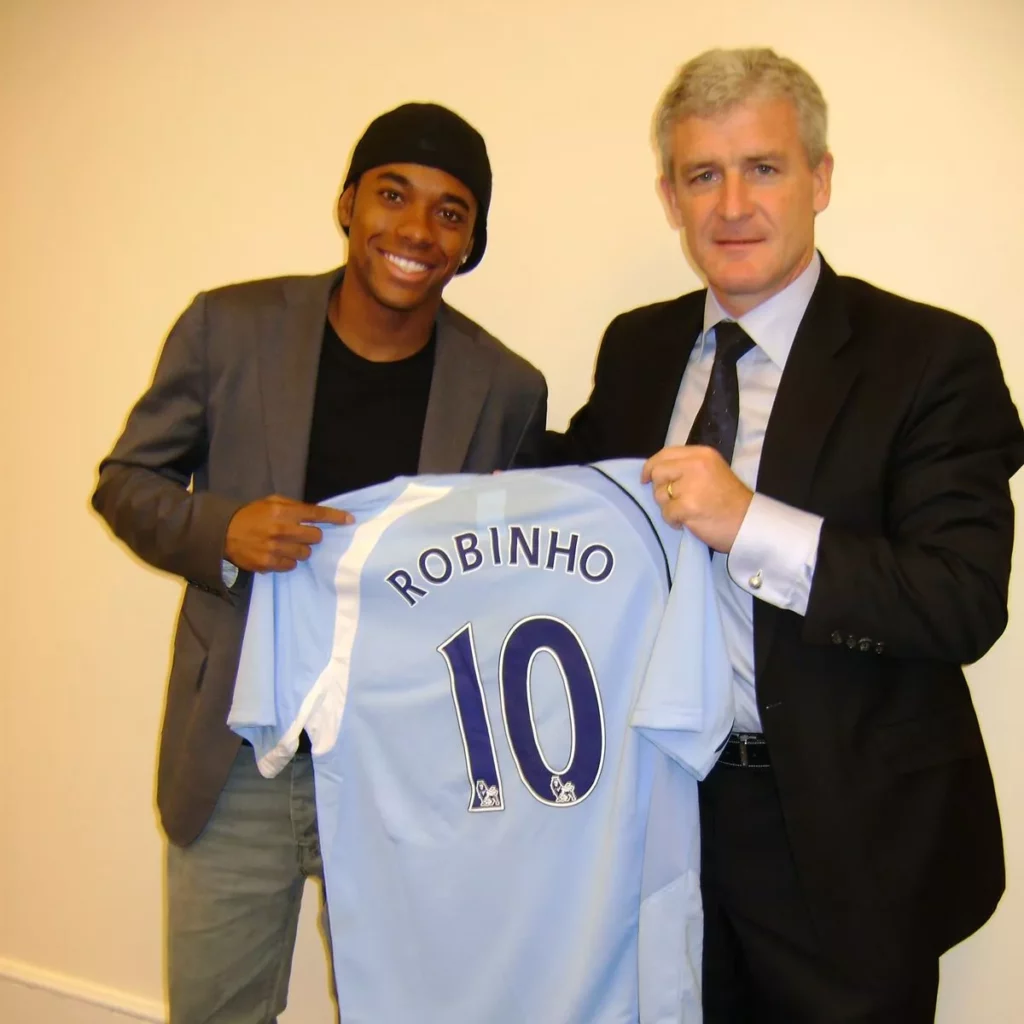
Manchester City
Robinho’s £32.5 million transfer to Manchester City in September 2008 made him the most expensive player in British football at that time. His statistics during this period reflect both his initial impact and the subsequent struggles that led to his departure after just 18 months.
With Manchester City, Robinho made 53 appearances, scoring 16 goals and providing 12 assists without winning any titles. His goal-scoring rate at Manchester City (0.30 goals per game) represented an improvement over his Real Madrid numbers, though his overall impact diminished during his second season.
His Premier League debut against Chelsea—in which he scored City’s only goal in a 3-1 defeat—proved to be one of the highlights of his time in England.
Most of Robinho’s goals for City came at the Etihad Stadium, with his away form being notably less impressive. This home-away disparity became a talking point among fans and analysts, with some suggesting it reflected adaptation issues to English football.
AC Milan
Robinho’s four-season stint at AC Milan (2010-2014) represented one of the more stable periods of his European career. His statistics during this period showed a player who had matured, contributing more consistently to team success while perhaps losing some of the explosive individual brilliance of his younger years.
During his time at AC Milan, Robinho appeared in 144 matches, scoring 32 goals and providing 31 assists. He won Serie A (2010-11) and the Italian Super Cup (2011). With a goal-scoring rate of 0.22 goals per game at Milan, Robinho’s numbers continued the gradual decline from his Santos peak. However, his assist statistics remained strong, highlighting his evolution into a more complete team player.
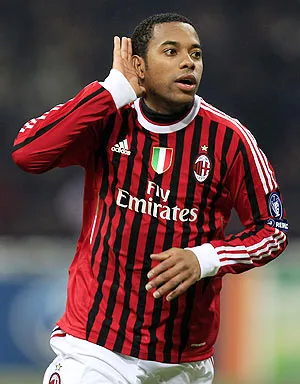
His most productive season came in 2010-11, when he scored 14 goals and provided 12 assists across all competitions, helping Milan secure the Serie A title.
Guangzhou Evergrande, Atlético Mineiro and Others
The latter stages of Robinho’s career saw him play for several clubs across different continents, including Guangzhou Evergrande in China and various teams in Brazil and Turkey. These periods were characterized by shorter stints and diminishing statistical returns.
At Guangzhou Evergrande (2015), he made 10 appearances with 3 goals and 2 assists, winning the Chinese Super League. His time at Atlético Mineiro (2016-2017) was particularly productive, with 38 goals and 12 assists in 68 appearances, winning the Campeonato Mineiro in 2017. This was followed by spells at Sivasspor (31 appearances, 12 goals, 5 assists) and İstanbul Başakşehir (12 appearances, 4 goals, 2 assists), where he won the Turkish Super Lig in 2019-20.
Robinho’s time at Atlético Mineiro stood out as particularly productive, with a goal-scoring rate (0.56 goals per game) that surpassed even his early Santos numbers. However, this came in a less competitive league and at a stage when his international career was effectively over.
International Statistics
Performances for Brazilian National Team
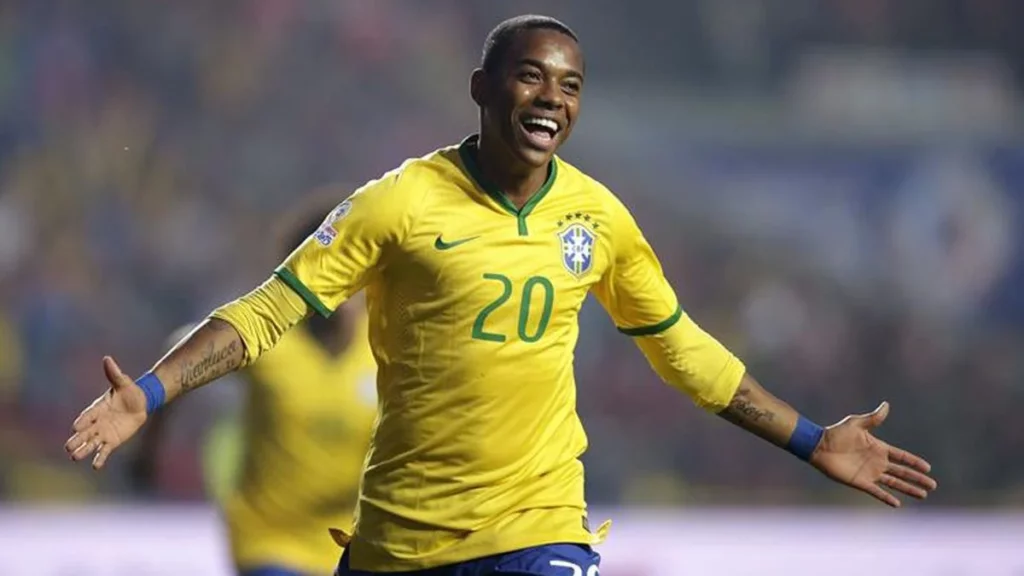
Robinho’s international career with Brazil spanned from 2003 to 2017, during which he accumulated impressive statistics while representing his country across multiple major tournaments. In total, he earned 100 caps, scoring 28 goals and providing 19 assists after making his debut against Nigeria on July 13, 2003. His final appearance came against Colombia on January 25, 2017.
His 100 caps place him among Brazil’s most-capped players, reflecting his importance to the national team setup over nearly 15 years. His goal ratio of 0.28 goals per game at international level is respectable for a player who often operated as a winger or second striker rather than a central forward.
Goals in Cups and Tournaments
In World Cup competitions, Robinho made 9 appearances across two tournaments (4 in 2006, 5 in 2010), scoring 2 goals. His Copa América record was more impressive, with 6 goals in 6 appearances during the 2007 tournament (where he was top scorer), though he failed to score in subsequent tournaments in 2011 and 2015. In the Confederations Cup, he scored 3 goals across 10 appearances in the 2005 and 2009 editions.
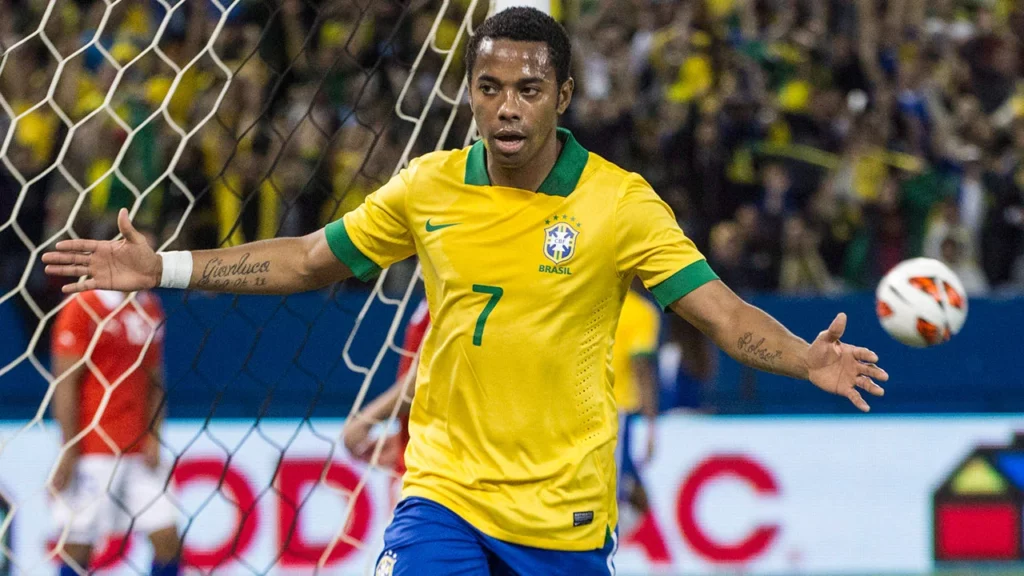
Robinho’s standout tournament came at the 2007 Copa América, where his six goals earned him the Golden Boot as tournament top scorer. His performances helped Brazil defeat Argentina 3-0 in the final, capturing what would be his most significant international trophy.
Individual Achievements
Personal Awards and Recognitions
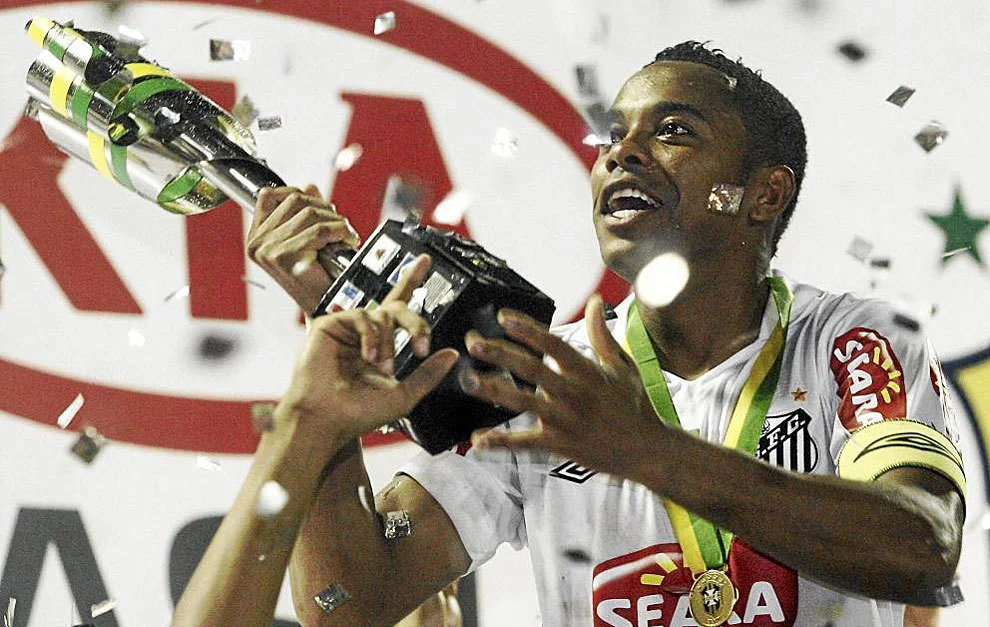
Throughout his career, Robinho received various individual accolades that recognized his technical ability and match-winning contributions. These included the Copa América Golden Boot (2007), Campeonato Brasileiro Best Player (2004), Bola de Ouro (Brazilian Golden Ball) (2004), Campeonato Paulista Best Player (2015), and being AC Milan’s Top Scorer (2010-11). He was also named Manchester City Player of the Month on multiple occasions.
These honors reflect Robinho’s impact across different competitions and his ability to stand out even among elite company. The Bola de Ouro in particular—awarded to the best player in Brazilian football—highlighted his status as his country’s premier talent in the mid-2000s.
Records and Memorable Moments
Beyond formal accolades, Robinho achieved several statistical milestones and memorable performances. He was the first player to score a hat-trick for Manchester City in European competition, scored on debut for Real Madrid, Manchester City, and Brazil, earned his centenary cap for Brazil in 2015, and shares the record for most goals in a single Copa América tournament by a Brazilian (6 goals, 2007). He also scored the 1000th goal in UEFA Champions League history for Real Madrid against Olympiacos in 2005.
Particularly memorable was Robinho’s hat-trick against Chile in a 2009 World Cup qualifier, which showcased his ability to single-handedly dismantle international opposition. Similarly, his four-goal performance for Santos against Bahia in 2004 stands as perhaps his most impressive club display.
Statistics by Position and Role
Playing on the Wing and in Attack
Robinho’s versatility allowed him to operate across multiple positions with varying statistical output. His primary position was left wing (319 appearances, 76 goals, 65 assists), though his goal-per-game ratio was highest as a second striker (0.39). He also recorded impressive numbers for successful dribbles (3.1 per game), chances created (1.9) and fouls won (2.2). These statistics paint a picture of a creative attacker whose numbers, while strong, fell short of extraordinary expectations placed upon him. His performance peaked in familiar environments like Santos and Brazil’s national team, and his playing style evolved from flashy individualism to team-oriented contributions during his AC Milan years. Ultimately, Robinho’s statistics secure him among Brazil’s accomplished forwards of the 2000s, though short of all-time great status his early promise suggested.